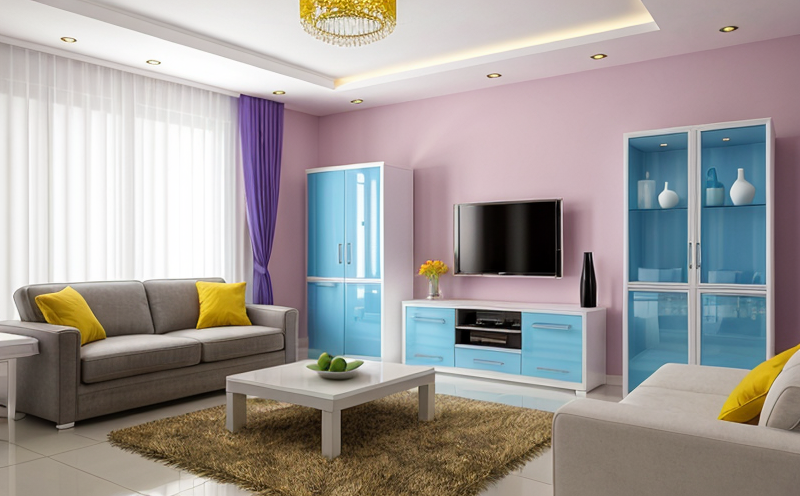IEC 60721 Climatic Resistance Testing of Decorative Plastics
The International Electrotechnical Commission (IEC) Standard IEC 60721 is a critical tool for ensuring the durability and reliability of decorative plastics used in various home decoration applications. This standard specifically addresses the climatic resistance testing needed to evaluate how well these materials perform under extreme environmental conditions, including temperature fluctuations, humidity, and UV exposure.
Decorative plastics are widely employed in home furnishings such as flooring, furniture, wall panels, and ceiling tiles due to their aesthetic appeal, durability, and cost-effectiveness. However, the performance of these plastics can degrade significantly if they do not withstand long-term exposure to environmental stressors. IEC 60721 provides a standardized method for assessing how decorative plastics will maintain their appearance and functionality over time.
The testing protocol outlined in IEC 60721 involves subjecting specimens of decorative plastics to controlled environments that simulate real-world climatic conditions. This includes both temperature cycling and humidity conditioning, as well as UV radiation exposure. The goal is to determine if the plastic remains stable after prolonged exposure to these elements.
Once testing is complete, laboratories provide detailed reports on the performance of the materials under test. These reports are essential for quality managers, compliance officers, R&D engineers, and procurement teams to make informed decisions about material selection and product design. Understanding the long-term behavior of decorative plastics helps manufacturers optimize their products for better marketability and customer satisfaction.
The IEC 60721 standard is particularly important in ensuring that home decoration materials meet international quality standards and comply with regulatory requirements. By adhering to this standard, companies can enhance their reputation as reliable suppliers and ensure they are meeting the expectations of customers who demand high-quality products.
For R&D engineers specifically, IEC 60721 offers a valuable framework for developing new decorative plastic formulations that not only meet current standards but also anticipate future market demands. This forward-thinking approach can provide a significant competitive edge in an increasingly demanding industry.
The testing process typically begins with careful specimen preparation, ensuring that the samples accurately represent the final products. Once prepared, specimens are subjected to controlled environmental conditions designed to replicate real-world climatic stressors. The results of these tests provide invaluable data that informs ongoing product development and quality assurance efforts.
Why It Matters
The importance of IEC 60721 cannot be overstated, especially for companies involved in home decoration and design. Decorative plastics are not just aesthetic elements but functional components that contribute to the overall performance and longevity of furniture and furnishings.
- Enhanced Durability: Ensuring materials can withstand harsh environmental conditions extends the life cycle of products, reducing waste and the need for frequent replacements.
- Better Quality Assurance: Compliance with IEC 60721 helps identify potential flaws early in the development process, leading to higher-quality final products.
- Regulatory Compliance: Meeting international standards like IEC 60721 is essential for exporting goods and ensuring they meet local regulations.
The testing process also supports sustainable practices by encouraging the use of materials that are more resilient to environmental degradation, thus reducing the ecological footprint associated with product disposal.
In summary, adhering to IEC 60721 is crucial for maintaining a competitive edge in the home decoration industry and ensuring compliance with global standards. It fosters innovation while promoting responsible manufacturing practices.
Environmental and Sustainability Contributions
- Sustainable Materials: By selecting materials that pass IEC 60721, manufacturers can contribute to the reduction of waste in landfills. Durable decorative plastics last longer and require less frequent replacement.
- Eco-Friendly Design: Products that withstand climatic stressors are more likely to be reused or recycled, promoting a circular economy.
- Reduced Resource Consumption: Ensuring materials have long lifespans means fewer resources need to be used for production and replacement.
The use of IEC 60721 in home decoration plastics testing directly supports environmental sustainability by encouraging the development and adoption of eco-friendly materials. This not only benefits manufacturers but also contributes positively to overall environmental health.
Competitive Advantage and Market Impact
- Durable Products: By ensuring products meet IEC 60721 standards, companies can offer more reliable and long-lasting home decoration materials, enhancing customer satisfaction.
- Innovation Leadership: Adhering to international standards sets a benchmark for industry excellence and positions companies as leaders in innovation and quality.
- Global Market Access: Compliance with IEC 60721 opens doors to global markets, allowing manufacturers to reach customers worldwide who value high-quality products.
The impact of IEC 60721 on the market is profound. Companies that prioritize this standard are better equipped to meet consumer expectations and regulatory requirements, thereby gaining a competitive edge in an increasingly competitive industry.





